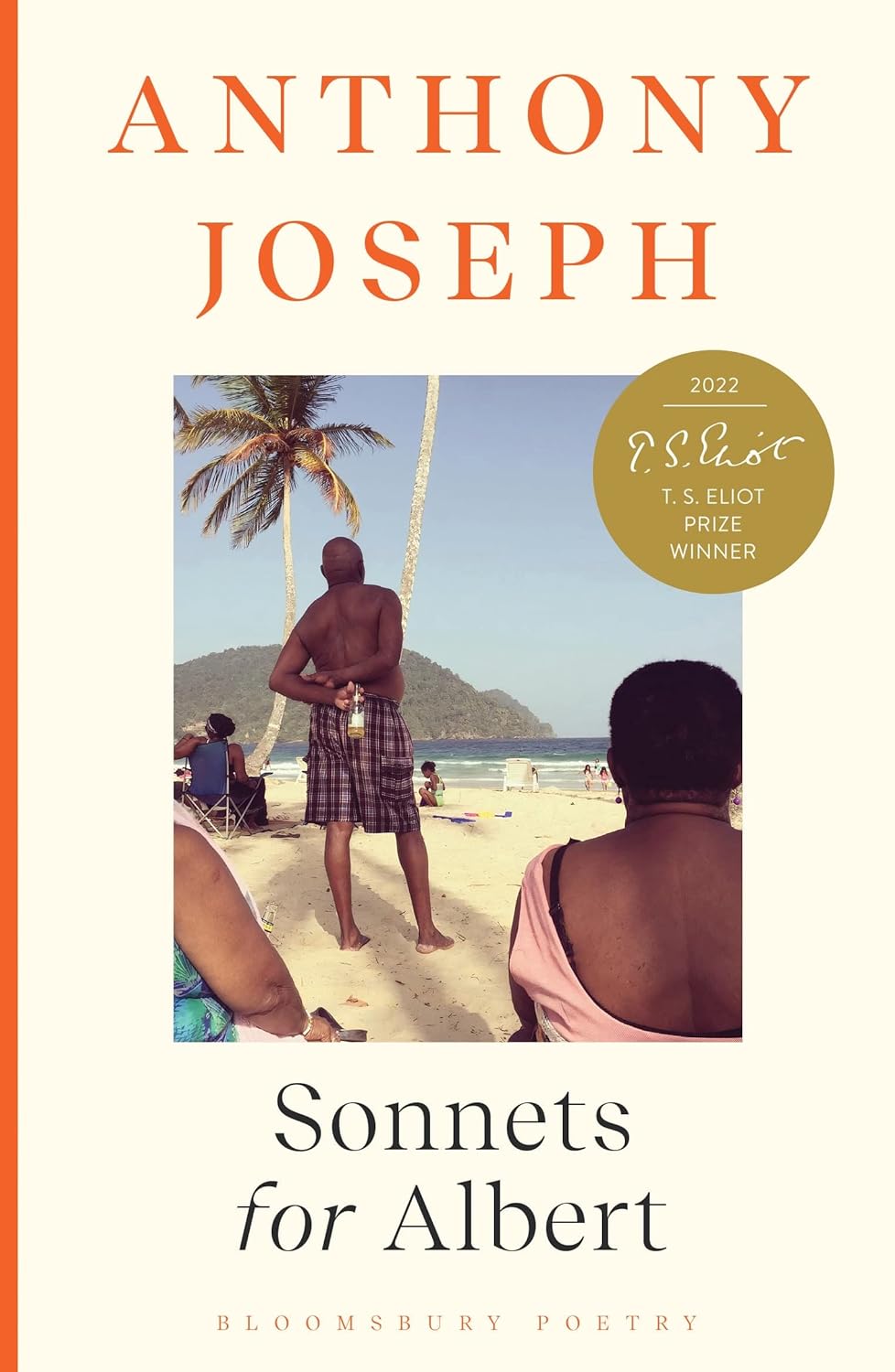Anthony Joseph‘s Sonnets for Albert (Bloomsbury, 2022) won the 2022 T.S. Eliot Prize for poetry. It contains around fifty poems that are all sonnets: fourteen-line poems, typically focused on or motivated by love. For Joseph, the figure of the persona’s gaze is his late father, Albert.
This isn’t an erotic love, of course. Nor are the sonnets a series of eulogies praising Albert’s character. In fact, there are far more negative than positive poems.
Nevertheless, the poems are positive in other ways. They generate strong feelings and evoke a sense of the fluid family structure that the poetic voice enjoyed. The poems offer vignettes of Albert, but also of Trinidad and Tobago, where he lived, as well as New York on 9/11, brothers, lovers and colleagues.
The poems model the way that poetry generates and makes meaning. Poetry doesn’t just recollect memory but makes it sing. And, in this way, the poet Joseph is a fine craftsman.
It’s unsurprising, then, that Joseph’s poetic voice uses the following as a verb: poem. As in, to poem—to write poetry.
To poem
In ‘Dreadlocks of mystery’, the persona meets with his father’s third son, Brendan. This son had been unknown to the family until they were older. The persona asks Brendan:
‘Do you have any specific memories of him,
Anthony Joseph, ‘Dreadlocks of mystery’ in Sonnets for Albert (London: Bloomsbury, 2022), p. 51
things I could poem?’
The response he gets only takes up three of the fourteen lines since ‘Brendan remembers in broad strokes’ (p. 51). It means that the poem is not in fact about the ‘”specific memories”‘ of Albert, but about the story of asking Brendan for memories.
Another prime example is the connection made between the two-parter ‘The Fancy Sailors at Memorial Park, Carnival Monday, 1973’ (pp. 21–2) and ‘P.O.S.G.H. I’ (p. 76).
‘The Fancy Sailors’’ two parts document the same event but from different perspectives. Part I is from the son’s perspective; part II is from the father’s. It is a version of William Blake’s Songs of Innocence and Experience in micro, with the same event replayed from an older and a younger voice.
In both, the father is dressed as a Fancy Sailor at the carnival, while ‘I have my firstborn, / high up on my shoulder’ (p. 22). This causes the father to worry because, while he enjoys watching the masquerade bands—called the ‘mas’—he doesn’t like it ‘when them fellas does fight’ and ‘when bottle pelt to bust people head’. This is mainly because ‘One day the boy might remember / that Carnival Monday and poem it’ (p. 22). Again we read the overlap between poem-ing and memory.
In ‘P.O.S.G.H. I’,[1] the persona visits his father in hospital after his first heart attack. This is the same hospital where the persona was born, the same place where his grandfather was hospitalised, and also where his mother ‘blinked hard / into cancerous death’ (p. 76).
In the final lines, the persona also tells us that this is the
same ex-colonial hospital
Joseph, p. 76
by Memorial Park where my father once lifted me onto his shoulders,
so I could see the carnival pass.
And so the son did ‘poem it’, as the father feared. However, he didn’t include any of the worries of watching fights during Carnival Monday. The memory–poem (memory-as-poem) is actually memory-adjacent. We might call it metonymic,[2] in which it’s about the associations that the Memorial Park has—connecting to the hospital—rather than the actual Park itself.
As with ‘Dreadlocks of mystery’, these poems about memory sidestep the memory being poemed. Something else is emerging.
Dynamic memory
No memory is static, and these poems prove it. I think that they frequently prove it by ‘forgetting’ or avoiding the memory that is supposedly the inspiration of the poem. Instead, the memories are dynamic or generative: they produce something else.
This idea of production is fundamental to the Greek word poiesis from which the English ‘poetry’ derives. Poiesis is a kind of making and of generative production. I have written elsewhere about this:
A commitment to poiesis is a commitment to perpetual becoming, to thriving in liminality between being and non-being, life and death, the past servicing the future[.]
Nicholas Taylor-Collins, Shakespeare, Memory, and Modern Irish Literature (Manchester UP: 2023), p. 89.
I wrote that in relation to James Joyce’s novel Ulysses (1922), but I think it is also relevant here.
For instance in ‘Sea Echo’, the persona asserts that he only ‘remember[s] fragments’ of his father. Even the memories in the poem falter: ‘This was just before he left for Tobago / —no—it was the year he briefly came back.’ (p. 61)
Despite all of these admissions of inaccuracy, the poem is about some kind of success. In the ‘dim-lit light, / a car crashing and folding upon itself, / my father emerges alive to inspire poems’ (p. 61). Here is the poiesis spelled out: the memory inspires rather than mimetically re-telling the memory in poetic terms.
This poietic reading is confirmed by the poem’s opening words: ‘Imagine if […]’ (p. 61) These biographical or documentary poems are actually couched within the immaterial world of imagination.
The memory–poem?
The final line of ‘The chef’ is instructive. The poem tells of Albert’s taking over the cooking from his mother ‘saying oh how he can cook’ (p. 54) as he improves a stew with red rum. As Albert steps back from the pot he smiles. Then the persona takes over: ‘The smoke fades but infiltrates a poem, years later.’ (p. 54)
In this meta-poetic awareness, there are several layers of meaning. First is the idea I’ve been circling in this post, namely that the poem is as much the location of the memory as any idea that precedes the poem. We might call these memory–poems since the memory cannot exist without the poem.
Another layer helps us to think about the character of Albert, and how he exists in these poems only secondarily, even though the book was supposedly about Albert. In fact, the collection contains Sonnets for Albert: staring closely at the cover, we can see how the ‘for’ is emphasised. These are not necessarily about him (though they often are), but instead some kind of gift.[3]
Finally, I point out that there has been no previous mention of the smoke that ‘infiltrates’ a poem (this poem) ‘years later’. The smoke is invented—or imagined—and memorialised at the same time. A kind of veil obscuring the past, it also acts as a veil hiding the poietic process itself.
So, not only do the poems generate meaning, as I wrote above, but they also generate memories. The poems are as dynamic as the memories and offer a correction to my label of memory–poem.
Instead, what Joseph’s Sonnets for Albert offers are poem–memories. ‘To poem’ might then be understood as an invention of real memories.
[1] This acronym for Port of Spain General Hospital. Port of Spain is the capital of Trinidad.
[2] ‘Metonymy’ is the use of language to stand in for something with which it is commonly associated. For instance, news broadcasters often refer to ‘Number 10’ to mean the prime minister, or to ‘Westminster’ when they mean parliament. ‘Synecdoche’—the representation of an object by its part, as in a sail signifying a whole boat—is a special type of metonymy.
[3] The poem ‘Poetry’ details the persona gifting a book of poems to Albert (p. 84). He is not overly impressed.


Leave a Reply